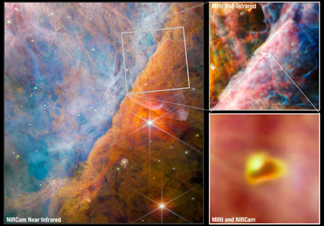For the first time, scientists have found the molecule necessary for the origin of life outside the Earth. it has been sought for over 50 years
 For the first time, scientists have discovered a special carbon molecule in space, which is important for the emergence of biological life. It was found in the protoplanetary disk of a young star, which is 1350 light years away.
For the first time, scientists have discovered a special carbon molecule in space, which is important for the emergence of biological life. It was found in the protoplanetary disk of a young star, which is 1350 light years away.
Scientists analyzed spectral data collected by the James Webb Observatory and discovered previously unknown spectral lines. After four weeks of work, the scientists managed to identify the source of these signals, the methyl cation (CH3+) molecule. This compound was first discovered outside of Earth.
According to the theory that appeared in the 70s of the last century, the formation of methyl cation is an important stage for the emergence of biological life on Earth and in space. The methyl cation acts as a catalyst or mediator to initiate many chemical reactions that can eventually lead to the formation of compounds in organic chemistry.
To confirm this hypothesis, the methyl cation would have to be detected in space, but radio telescopes cannot detect it due to the peculiarities of its structure, and infrared telescopes on Earth cannot make such observations.
The discovery was made possible by the James Webb Space Observatory, with its revolutionary spectral and infrared sensitivity and the highest spatial resolution available today.
The observatory was able to detect a methyl cation molecule in the protoplanetary disk of d203-506, a small red dwarf in the Orion Nebula. A feature of this object is that the protoplanetary disk is subject to strong UV bombardment by nearby younger and more massive stars. It is important to note that the red dwarf itself is not capable of producing such UV radiation. Surprisingly, instead of destroying the methyl cation, UV radiation provides energy to start the process of its synthesis. This happens at the initial stage of the birth of organic chemistry and not only does not harm it, but also contributes to its development.
The discovery of a methyl cation in the d203-506 protoplanetary disc was not the only unusual feature. In this system, a water molecule, which is usually present everywhere, was not found. Scientists speculate that the reason for this may be strong ultraviolet radiation at a certain stage of the development of protoplanetary disks.
Either way, researchers have gained more information about the early stages of the development of organic chemistry and the origins of life on Earth and in space. This information will ultimately help build a coherent and compelling theory that will be supported by new observations.